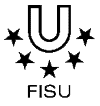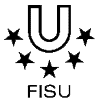 BRUSSELS – An Intercontinental Council meeting was held in Brussels on 22 May 2014 after the Steering Committee meeting.
BRUSSELS – An Intercontinental Council meeting was held in Brussels on 22 May 2014 after the Steering Committee meeting.
This meeting was directed by the FISU First Vice-President and Chair of the Intercontinental Council, Oleg Matytsin (RUS). Stefan Bergh (SWE) and Alison Odell (GBR) vice-chaired the meeting. The following representatives from the 5 continents attended the meeting: Adam Roczek (POL) from EUSA (Europe), Xinsheng Zhang (CHN), Kenny Chow (HKG) and Cheng Fave Seetow (SIN) representing AUSF (Asia), Martin Dolton (AUS) from OUSA (Oceania), Malumbete Ralethe (RSA), Leopold Senghor (SEN), Jacob Nteere (KEN) and Penninah Kabenge (UGA) representing FASU (Africa), and Sotero Vasquez (DOM) from ODUPA (America). The FISU Development Department was represented by Laurent Briel, Director of Development, and Westley Rolin, Development Assistant.
After the welcome speech of the IC Chair and the approval of the agenda, the continental federations (CUSFs) explained how they handled the 2013 projects and what is coming up in 2014. They expressed their appreciation of the guidance provided by the external auditor contracted by FISU, which allowed them to improve their auditing processes.
In 2014, FISU is supporting 33 CUSF projects covering various development areas. As their umbrella organisation, FISU gives, through the IC, the opportunity to the CUSFs to exchange and learn, acting as a common platform and taking into account the different contexts of each continent.
The IC welcomed the idea of having a fixed timeline repeated every year concerning the funding cycle of the projects because it makes it easier to plan the activities.
It also discussed possible amendments to be made to the Draft Guidelines on the rights and obligations of the CUSFs. This document offers the first comprehensive framework of cooperation between CUSFs and FISU, dealing for example with affiliation, financial aspects, visual identity, exchange of information, ethical principles, and so on. It is meant to be regularly updated according to the feedbacks from the different partners.
(Source: W. Rolin, Development Assistant)
